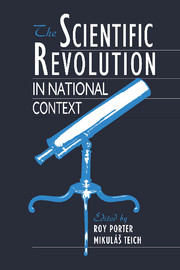Book contents
- Frontmatter
- Contents
- Notes on contributors
- Acknowledgements
- Introduction
- 1 Scientific Revolution, social bricolage, and etiquette
- 2 The Scientific Revolution in France
- 3 The Scientific Revolution in the German Nations
- 4 The new philosophy in the Low Countries
- 5 The Scientific Revolution in Poland
- 6 The Scientific Revolution in Spain and Portugal
- 7 The Scientific Revolution in England
- 8 The Scientific Revolution in Bohemia
- 9 Instituting science in Sweden
- 10 The Scientific Revolution in Scotland
- Index
8 - The Scientific Revolution in Bohemia
Published online by Cambridge University Press: 05 June 2012
- Frontmatter
- Contents
- Notes on contributors
- Acknowledgements
- Introduction
- 1 Scientific Revolution, social bricolage, and etiquette
- 2 The Scientific Revolution in France
- 3 The Scientific Revolution in the German Nations
- 4 The new philosophy in the Low Countries
- 5 The Scientific Revolution in Poland
- 6 The Scientific Revolution in Spain and Portugal
- 7 The Scientific Revolution in England
- 8 The Scientific Revolution in Bohemia
- 9 Instituting science in Sweden
- 10 The Scientific Revolution in Scotland
- Index
Summary
‘historians write about scientific revolutions as automatically as of political, economic or social revolutions’ – these are the words with which Roy Porter began his stimulating deliberation on the Scientific Revolution. He is right, of course. Thanks to the intensive work of historians of science over the recent decades, the concept of Scientific Revolution has become deeply embedded in the consciousness of current historiography.
Nevertheless, we shall be going back to the concept of Scientific Revolution again and again. Certainly partly because this concept in itself, although it has now been the subject of tens of monographs and thousands of articles, is still relatively new. However, also because the concept of revolution itself is very flexible and may adopt the most various forms, depending on the field in which the revolutionary changes are taking place.
Let us attempt to present a small parallel between the classical political revolution and the Scientific Revolution. Let us consider two examples, two types of political revolution which are among the best known: the French Revolution of the end of the eighteenth century (and let us ignore the exceedingly strict opinions voiced by the British Prime Minister on the occasion of its 200th anniversary), and the Russian Great October Revolution of 1917. It seems to me that both satisfy the prerequisites already developed with regard to Classical ancient drama and observed, for instance, by Shakespeare, Moliere, or even Havel. These amount to the principle of three unities: the unity of place, time and action.
- Type
- Chapter
- Information
- The Scientific Revolution in National Context , pp. 210 - 239Publisher: Cambridge University PressPrint publication year: 1992

